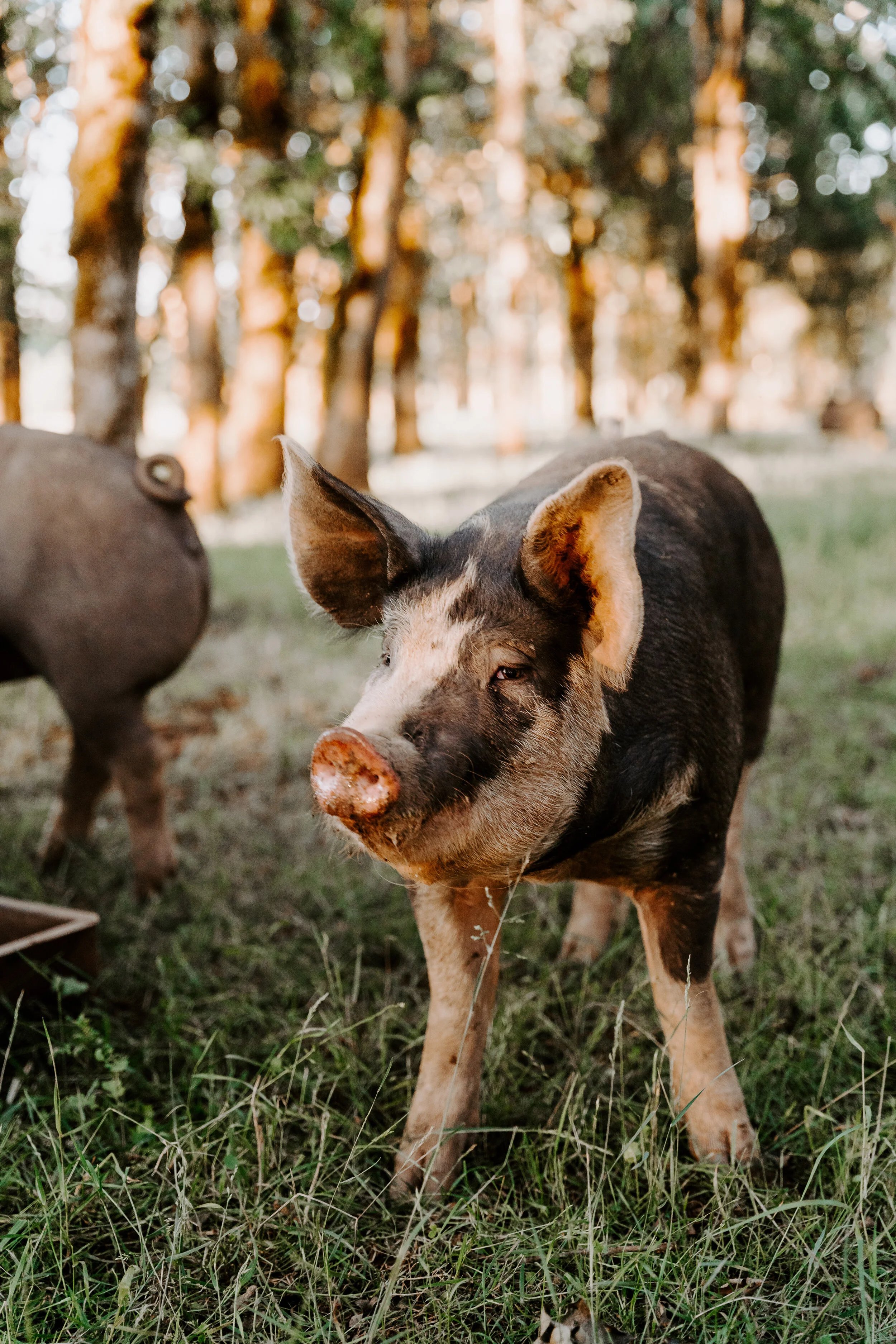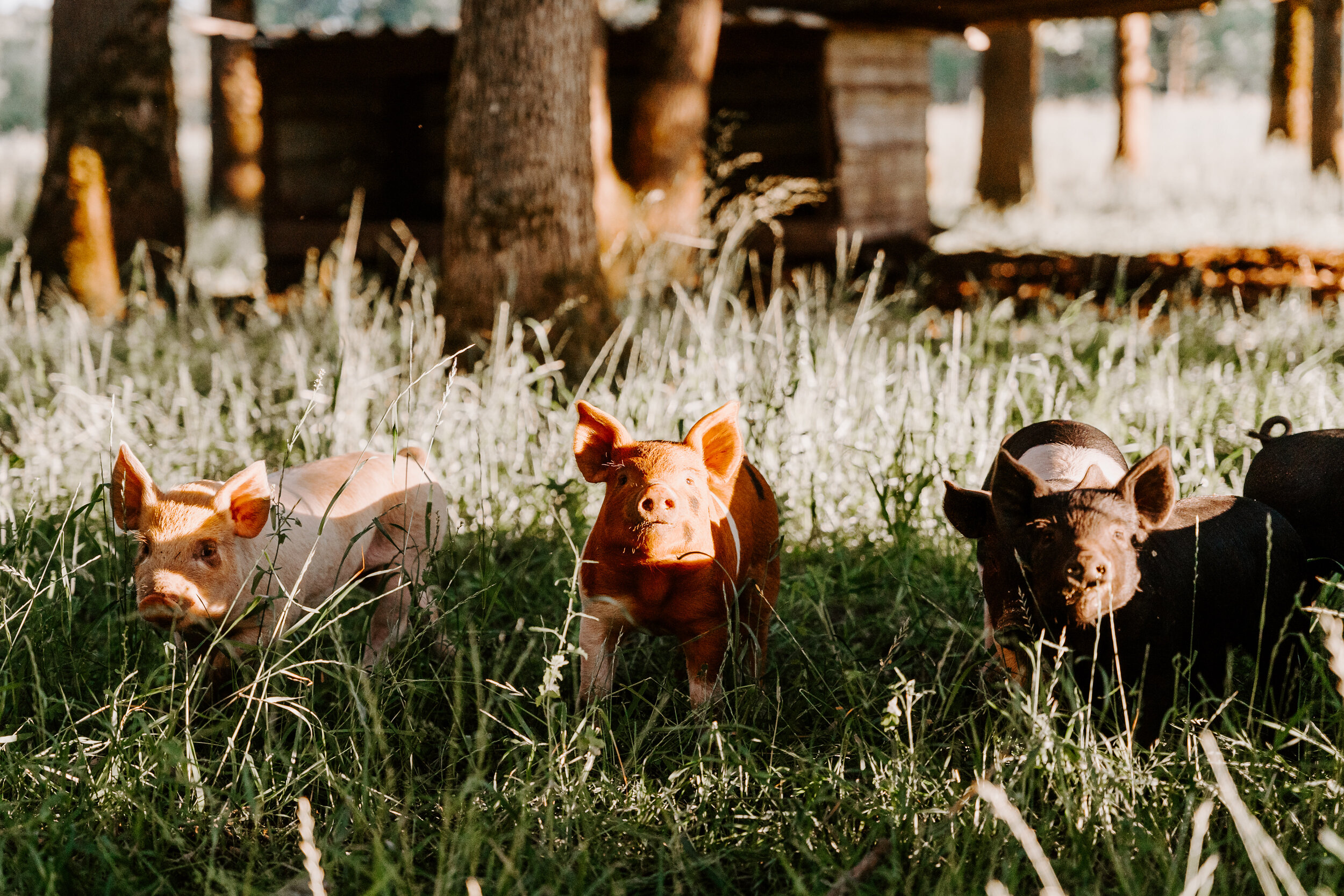Today I felt impressed to share with you a little about HOW the mental health of our hogs affects your meat.
There is energy in everything around us. A ray of light, a flower, a field of green grass. A positive thought, a negative thought.
Energy is transferable.
When you read a disturbing headline or hear some bad news it will effect your energy and your mood.
Think for a minute if you watched a really inspirational movie and afterwards you are are on cloud 9, feeling inspired and moved.
You were energetically impacted by that movie.
Lets translate that to the food you consume.
It holds energy too.
A fresh green bean from the garden or farmer’s market has more life energy than a can of green beans off a shelf.
A pork chop from a hog raised indoors, under artificial lights, crowded with it’s siblings, all screeching and squealing at mealtime will have a different energy than a hog raised in an oak forest.
It only makes sense that if the animal you are eating lived a traumatic life that can transfer to you, either in taste or actual energy.
The mental health of our hogs matter.
To you, to us, to them.
Both Blake and I come from careers in animal behavior and psychology. I studied natural horsemanship and taught my students to read their horses subtle body language. I taught them how to read the ears, eyes, tail, breathing, and sweat patterns of their horses.
Blake came from a career of Wildlife Biology. Also heavy in studying wildlife behavior and patterns. There is a certain savvy that comes from being a student of animals and studying their behavior, living amongst them, and working with them.
I'm sure you have that level of understanding in your area of expertise too.
Just the other day, as we were talking about how natural our pigs live, what a good life they have, and how contrary it is to how grocery store pork is raised, he told me this story:
When he was a young man he was volunteering at a zoo in Germany. His task for the day was to fill in a trench 12" wide in the bears pen. The bear had worn this ditch along the fenceline of his enclosure by pacing back and forth. He remembers that the bear would walk down to one end, stand up on its haunches and pivot the other direction and walk to the other end. Back and forth all day long until it wore a path. That bear was not in a good space mentally. The artificial environment, although humans thought it was pretty and clean, was not what the animal needed.
Pigs who live in confinement have similar displaced behaviors. Things like chewing on the tails of other pigs, excessive squealing, chewing on the bars, frothing at the mouth, climbing over pen walls.
So the solution in that world is clipping teeth, docking tails, building bars that go over the tops of pens and wearing protective ear muffs when they go into the pig barns.
Confinement hogs also live on metal or plastic slats so the manure can be washed through. Their sewage sits in a lagoon underneath them. The odor of any confinement farm is often a big complaint of neighbors, not to mention unpleasant for the hogs.
Blake remembers how noisy it was in the pig barn at feeding time growing up 30 years ago. His dad had 500 pigs at one point, raised conventionally indoors. It was an ear piercing squeal that put you on edge, and is probably part of the reason he is hard of hearing.
Not here on our farm.
Our pigs live in a 5 acre oak grove, in the fresh open air. They enjoy the natural rhythms of sunlight and darkness.
They have logs to turn over, grasses to munch, grubs to dig for, acorns to discover and lots of room to move about.
They live on the dirt, they may even eat the dirt to build their immunity. If they find a patch of clay or charcoal they might eat that too.
They don't need antibiotics, and to catch wind of their poo you have to basically be standing overtop a pile.
I know I'm preaching to the choir here, you already have found our farm, but your work is in telling others why you buy from us rather than the cheap meat at Costco or Safeway.
Your contribution can be in sharing the difference between conventional animal farming at the expense of the animal’s well being and what we do.
Please send this blog to a friend who wants to be tuned in energetically to their food.
I’m curious, had you ever thought about energy transferring to you through the food you eat?




